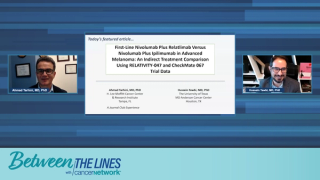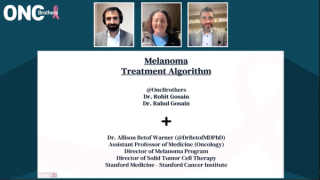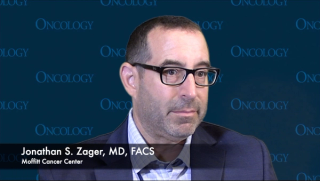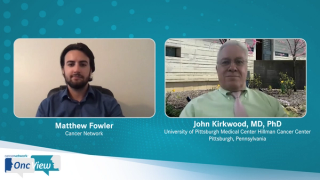
Skin Cancer & Melanoma
Latest News
Latest Videos

Podcasts
CME Content
More News

D-MNA achieved complete clinical clearance in 60% of patients, with no dose-limiting toxicities or serious adverse effects observed in those with basal cell carcinoma of the skin.
![A third of patients had a response [to lifileucel], and of the patients who have a response, half of them were alive at the 4-year follow-up.](https://cdn.sanity.io/images/0vv8moc6/cancernetwork/6b7c9a3270c71a70749ba86000cfc78a29d74309-2988x1702.png?w=350&fit=crop&auto=format)
“It’s a treatment for those patients who don’t have any other effective treatments available,” said Muhammad Umair Mushtaq, MD, on lifileucel in melanoma.

“There is margin to improve on these treatments, but this is a real hope for patients with melanoma,” said Mushtaq on TIL therapies.

The novel cancer vaccine plus pembrolizumab missed statistical significance but generated a clinically meaningful improvement in advanced melanoma.
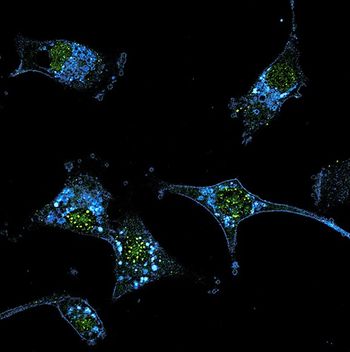
At 4 years, about 20% of patients with advanced melanoma who received tumor-infiltrating lymphocyte therapy were alive and responding to treatment.

Innovative oncolytic virus therapies transform advanced melanoma treatment, enhance patient outcomes, and overcome resistance to traditional immunotherapies.

Bhuvanesh Singh, MD, has big plans for enhancing the skin cancer program at Northwell Health.

Experts analyze the evolving landscape of melanoma treatment, highlighting key clinical trials and strategies for optimizing patient outcomes.

The SCIB1/iSCIB1+ cancer vaccines plus nivolumab and ipilimumab improved responses vs nivolumab and ipilimumab alone in patients with melanoma.

The FDA indicated that data from the phase 1/2 IGNYTE trial were not adequate to provide evidence of effectiveness.

The B7-H3–low and TIGIT-high biosignatures correlated with superior event-free survival outcomes in those with melanoma treated with the combination.

ATR04-484 showed inhibition of both methicillin-sensitive and methicillin-resistant Staphylococcus aureus bacteria strains, which are associated with rash.

Phase 3 data demonstrate the potential utility of BRAF/MEK inhibition in the adjuvant setting for patients with stage IIB/IIC BRAF V600–mutant melanoma.
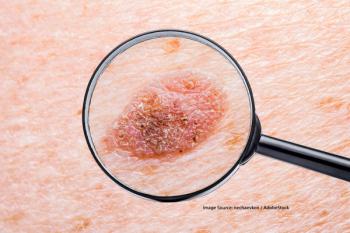
A phase 3 trial evaluating frontline IFx-2.0 with pembrolizumab in advanced/metastatic Merkel cell carcinoma is planned to start later in June 2025.

Data from the IGNYTE trial demonstrate the development of a robust systemic antitumor response following treatment with RP1.
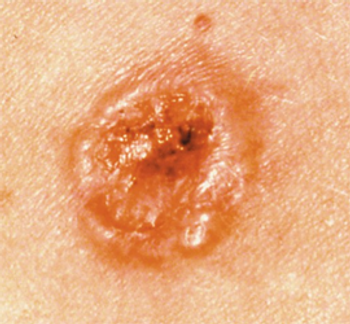
Compared with nivolumab alone, nivolumab/relatlimab did not improve RFS in patients with resected stage III to IV melanoma.

The combination elicited a clinical benefit rate of 63.0% and an overall response rate of 22.2% in anti–PD-L1–refractory melanoma with melanoma brain metastases.

Efficacy across most patient subgroups appeared to be consistent with relatlimab/nivolumab vs ipilimumab/nivolumab in patients with advanced melanoma.

No treatment-related deaths were observed among patients with metastatic uveal melanoma treated with melphalan and a hepatic delivery system.

The combination of nurulimab plus prolgolimab enhanced PFS, ORR, and DCR compared with prolgolimab monotherapy in unresectable or metastatic melanoma.

ctDNA levels may help to predict early recurrence for patients with stage III melanoma before adjuvant therapy and during follow-up.

All patients identified as low risk for sentinel lymph node positivity with the DecisionDx-Melanoma test had recurrence-free status after 3 years.

Ahmad Tarhini, MD, PhD, and Hussein A. Tawbi, MD, PhD, discussed data from the RELATIVITY-047 and CheckMate 076 trial for patients with melanoma.

Data from RELATIVITY-047 show consistent benefits with nivolumab/relatlimab across most patient subgroups, including those with BRAF-mutated disease.

The safety profile of nivolumab plus relatlimab in patients with stage III/IV melanoma was consistent with the known profiles for each individual agent.







